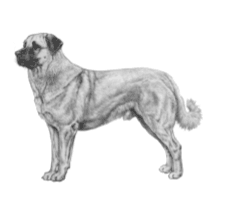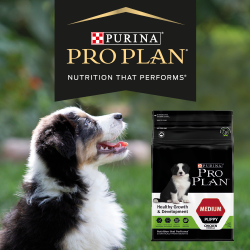Anatolian Shepherd Dog
General Information - Anatolian Shepherd Dog

Group:
Utility
Size:
Large
Lifespan:
10-13 years
Exercise:
Medium
Grooming:
Low
Trainability:
Medium
Watchdog Ability:
Very high
Protection Ability:
Very high
Area of Origin:
Turkey
Date of Origin:
Ancient times
Other Names:
Coban Kopegi, Karabash
Dog, Kara Bas, Kangal Dog
Original Function:
Flock guard
History
This is an ancient breed native to Asia Minor. It is also known as the Turkish Guard Dog where he protects flocks and serves as a shepherd's companion. On the high Anatolian Plateau, where summers are hot and very dry and winters are cold, the Anatolian Shepherd Dogs lives outside all year round. For centuries it was used as a combat dog in war and for hunting. It was particularly valued for the victorious battles it could fight with wolves. As a sheepdog, it was bothered by neither fatigue nor bad weather. Today it is still used as a sheep dog as well as a guard dog.Temperament
Alert and protective, the Anatolian Shepherd Dog is very possessive of its family and home. It must be properly introduced to all strangers. Though Anatolian Shepherds are easy to train and highly intelligent they are not for beginners and require a firm handler. Anatolian shepherds only reach full maturity at around 4 years of age.Upkeep
The Anatolian shepherd needs a chance to exercise every day, either with a long walk or brisk run. It can live outside in temperate to cool climates. Coat care is minimal, consisting only of a weekly brushing to remove dead hair.Anatolian Shepherd Dog
A breed standard is the guideline which describes the ideal characteristics, temperament, and appearance of a breed and ensures that the breed is fit for function with soundness essential. Breeders and judges should at all times be careful to avoid obvious conditions and exaggerations, as well as being mindful of features which could be detrimental in any way to the health, welfare or soundness of this breed.
Breed Standard - Anatolian Shepherd Dog
 General Appearance: Large, upstanding, tall, powerfully built, livestock guarding dog with broad strong head and dense double coat. Must have size and stamina. Capable of great speed.
General Appearance: Large, upstanding, tall, powerfully built, livestock guarding dog with broad strong head and dense double coat. Must have size and stamina. Capable of great speed.
Important Proportions: Foreface slightly shorter than skull.
Characteristics: An active breed originally used as a guard dog for sheep; hard working; capable of enduring extremes of heat and cold.
Temperament: Steady and bold without aggression, naturally independent, very intelligent and tractable. Proud and confident. Loyal and affectionate to owners, but wary of strangers when on duty.
Head and Skull: Large, but in proportion to body, broad between ears, slightly domed, with slight stop. Mature males have broader head than females.
Foreface: Seen from above almost rectangular. Profile blunt, tapering very slightly to end.
Nose: Black, except in livers, where it is brown.
Lips: Very slightly pendulous, black:edged. Edge of upper lip not lower than the profile of the underjaw. Tight lip:corners.
Eyes: Rather small in proportion to size of skull, set well apart, deep set, showing no haw. Golden to brown in colour according to coat colour. Eye rims black except in livers.
Ears: Medium sized, triangular in shape, rounded at tip, pendant with front edge close to cheek, higher when alert.
Mouth: Teeth strong, with a perfect scissor bite, i.e. the upper teeth closely overlapping the lower teeth and set square to the jaw. Complete dentition.
Neck: Slightly arched, powerful, muscular, moderate in length, rather thick. Slight dewlap.
Forequarters
Shoulders: Well muscled, oblique.
Forelegs: Set well apart, straight and well boned; of good length.
Elbows: Close to sides, free moving.
Pasterns: Strong, slightly sloping when viewed from side.
Body: Powerful, well muscled, never flat sided.
Topline: Rather short in proportion to leg length, horizontal, slightly arched over loins.
Underline: With the belly well tucked up.
Chest: Deep to point of elbow, ribs well sprung, ribcage sufficiently long.
Hindquarters: Powerful, not overloaded with muscles. Hindlegs vertical when seen from rear.
Thighs: Long.
Stifle: Good turn of stifle.
Feet: Strong, with thick pads and well arched toes. Nails short.
Tail: Long, reaching to hock, set on rather high, when relaxed carried low with slight curl; when alert carried high and curled over back, especially by males.
Gait/movement: Very noticeable level line of body, head and neck when walking; movement even, supple and long reaching, giving impression of stalking, with great power. Pacing acceptable at slow speed. Mincing or hackney action highly undesirable.
Coat
Hair: Short or mid:length, dense, with thick undercoat. Great variations in length according to climate. Longer and thicker at neck, shoulders and thighs. The coat tends to be longer in winter.
Colour: All colours acceptable.
Sizes
Weight: Mature dogs 50:65 kg (110-145 lbs), Mature bitches 40:55 kg (85-120 lbs)
Faults: Any departure from the foregoing points should be considered a fault and the seriousness of the fault should be in exact proportion to its degree.
Note: Male animals should have two apparently normal testicles fully descended into the scrotum.
DNZ No 603
Copyright Dogs New Zealand
Print 01 May 2017
Any departure from the foregoing points should be considered a fault and the seriousness with which the fault should be regarded should be in exact proportion to its degree and its effect upon the health and welfare of the dog and on the dog’s ability to perform its traditional work.



